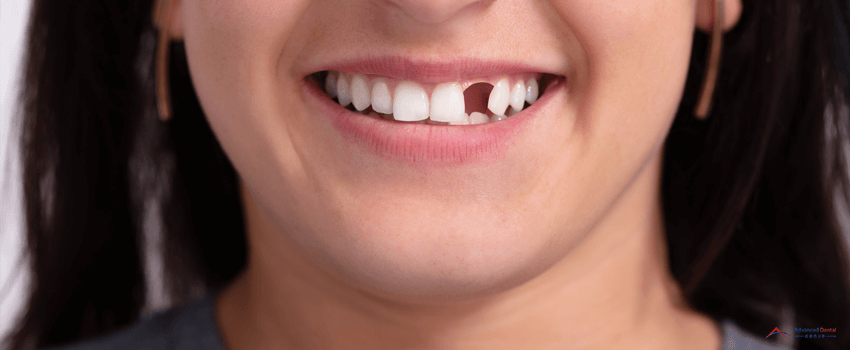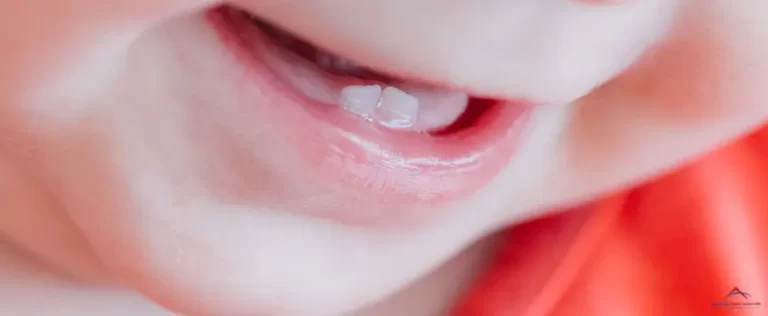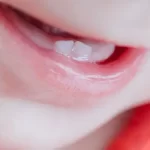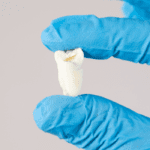All of us want to maintain our beautiful smiles over the years.
However, there will be situations where we can lose a tooth. Losing baby teeth that allow permanent ones to grow is a milestone for most children. But for adults, it’s not a good thing to experience. Losing one or two of your teeth may seem trivial, but there are serious consequences to them that threaten our overall health and well-being.
Tooth loss may seem inevitable as we age, but it can happen anytime. Fortunately, you can take steps to reduce tooth loss and prevent other health issues it causes.
Learn about the dangers of missing teeth and missing teeth problems with Advanced Dental Group.
Why do we lose teeth?
Missing teeth can cause a plethora of severe health problems. As we age, we encounter certain factors that can lead to tooth loss. Some are inevitable; some are preventable by practicing good hygiene, maintaining a healthy diet, and living a healthy lifestyle.
1. Poor Dental Hygiene
Missing dental appointments, not flossing enough, and other poor dental habits can cause many teeth conditions like tooth decay. Plaque buildup also damages the enamel. You may think these are your only problem; however, you have more severe problems like gum disease.
Gum disease can worsen into periodontitis when the spaces get too large and become infected. The bone and tissues supporting your teeth fall apart, loosening your teeth. They may require extraction.
2. Genetics
Genetics is also a risk factor for losing teeth. A study found that people with the beta-defensin1 gene are more likely to develop tooth decay in their permanent teeth.
Patients born with a cleft lip or palate have mouth development concerns; They have missing portions of the palate that may result in missing teeth.
Genetics are also linked to teeth misalignment. Crooked or overcrowded teeth make it difficult to clean and brush. Dentists and orthodontists can solve this problem using dental braces and aligners.
3. Drinking and Smoking
Smoking and drinking have severe consequences for the human body. Smoking decreases blood flow, increasing your risk of gum disease. It also slows down the healing process. According to the Centers for Disease Control and Prevention, 43% of people 65 and older who smoke have no teeth. This is especially true for binge drinkers.
4. Uncontrolled Diabetes
Uncontrolled diabetes leads to high blood sugar levels that can cause many dental problems; diabetes patients are 50% more likely to lose their teeth. It can reduce saliva production, leading to a dry mouth that slows healing. Infections and minor wounds become more severe over time, increasing your chances of gum disease and losing teeth.
5. Aging
Aging is inevitable. It’s also one of the most common reasons adults lose their teeth. However, age alone is not the only thing that causes tooth loss; it’s also the fact that older people have higher tendencies to develop more health problems. According to the CDC, 70.1% of older adults experience periodontal disease.
Adults over 65 are more likely to lose their teeth, and men 75 and older no longer have them.
6. Inadequate Professional Dental Care
Regular visits to the dentist are essential for maintaining good oral health. People who don’t regularly visit their dentists for a checkup are more likely to develop periodontal disease, preventing their dentists from cleaning their teeth thoroughly and spotting any minor problem that may worsen over time.
What happens when we have missing teeth?
Knowing the potential dangers of missing teeth might help you be more consistent and motivated about your dental care. If not, you might experience health problems that are more serious than cosmetic concerns when you have one or two teeth missing.
1. Difficulty in Eating
Teeth allow us to break down our food into smaller, easily-digestible pieces for our stomach. We use our incisors to bite and premolars or molars for grinding. Missing teeth affect your chewing abilities, leading to difficulties in eating food.
People with missing teeth may choose foods that are easier to eat instead of more nutritious foods that require more chewing. These changes in diet and lack of nutrition can lead to digestive problems and reduced nutrient intake.
2. Bone Loss
Our bodies rely on our jawbones to hold all our teeth together. Chewing and grinding food is an exercise for your jawbones, stimulating the bone and making it strong.
Your jawbone won’t get the exercise it needs if the area over it is missing a tooth that can stimulate it. This leads to bone resorption, one of the several effects of missing teeth. It’s a condition where the body reabsorbs the calcium from the jaw and distributes it to the rest of the body.
3. Crooked Teeth
Missing teeth can misalign your teeth. Your remaining teeth will try to fill in the space your missing tooth leaves, which eventually turns your smile crooked or adds more gaps between them.
Crooked teeth make brushing and flossing difficult, creating hard-to-reach areas where bacteria and cavities develop. Food particles can get stuck in these areas and become plaque, leading to an infection if left untreated.
4. Bite Problems
Because teeth shift with missing teeth, it will change how your teeth fit together. It may encourage bad dental habits like teeth grinding or clenching, which may cause cracks in your teeth or wear your teeth down. These bad habits eventually lead to teeth sensitivity, tension headaches, and muscle pain.
5. More Tooth Loss
Gaps in your teeth affect the health of the teeth surrounding it, which increases your risk of losing teeth.
6. Changes in Appearance
Missing teeth also affect your face’s shape. You may notice a difference in your appearance; you may look older, and your cheeks may sink if you don’t replace your missing teeth.
7. Speech Impediments
Our teeth are also part of speech. Missing teeth may make it more difficult to pronounce or enunciate certain words. It may distort some of your sounds and cause slurring and whistling whenever you talk, affecting your ability to have meaningful conversations with others.
8. Chronic Health Problems
Chronic health problems can result from missing teeth. Allowing bacteria to build up between your teeth will cause it to spread to other parts of your body. They can lead to serious health problems, including:
-
Heart disease
-
Cancer
-
Diabetes
-
Kidney disease
-
Alzheimer’s disease
Avoid the dangers of missing teeth with Advanced Dental Group.
We can connect you to our affiliate dentists in St. Petersburg, FL who are more than capable of teaching you how to care for your teeth properly. Aside from cleaning your teeth thoroughly, they also offer missing teeth solutions like dentures, implants, and bridges. Call us and start protecting your teeth from the dangers of missing teeth today.





